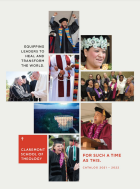First knowledge of the world, then compassion for it.
Daśavaikalika Sūtra 4.10
Timeless Wisdom for Today's Urgent Problems
Claremont School of Theology (CST) offers a first of its kind, remotely available Master of Arts in Engaged Jain Studies in partnership with Arihanta Institute (DBA Arihanta Academy). Bringing you leading scholars from around the world, this flexible remote program is designed to teach you how to apply timeless Jain wisdom in your busy everyday life whether you are Jain or not.
As a human society, we face unprecedented environmental and social challenges. Most Jains and non-Jains interested in learning about the Jain tradition therefore wish to understand how they can incorporate the tradition’s philosophical and moral insights in daily personal, professional, social, and familial life for the betterment of society and the planet. What makes our master’s degree remarkably one of a kind is just that: its emphasis on integrating what students learn from rigorous Jain scholarship on philosophy, ethics, history, and anthropology into their daily lives.
Yoga Dharma Non-Violence Non-Possession
Our MA’s interreligious course offerings augment these integrations with further critical and much sought-after insights from yoga, dharma traditions, and other religious philosophies while also providing elective courses that consider applications of fundamental Jain principles such as non-violence (ahimsa), non-possession (aparigraha), and openness to dialogue with other religious traditions (anekantavada) in light of allied fields such as animal studies, environmental studies, and business ethics.
Ahimsa is the paramount virtue in the Jain tradition that espouses non-violence in thought, word, and deed toward all forms of life including animals and the environment. Aparigraha, or non-possession, requires that we live a simple, non-consumptive life amidst the sensory trappings of contemporary consumer society and requires us to limit our material possessions to reduce our environmental impact. Anekantavada requires that we maintain an openness to learning about and appreciating other religious and philosophical viewpoints in addition to our own to create a more open-minded and peaceful society. To help integrate these principles from their coursework, students are encouraged to engage with their local communities, non-profit organizations, or other institutions to ensure engaged learning and application of their learning in service to the world.
Who would be interested in such a degree?
Anyone who wants to understand how to apply Jain philosophy and principles in daily life at the highest level, including, but not limited to:
- Young adult professionals and householders, both Jain and non-Jain
- Non-Jains who are aligned with Jain values and want to enrich their personal, spiritual, social, and professional lives (e.g. vegans, animal advocates, and environmentalists)
- Young adults and those in retirement who want to enhance their spiritual lives
- Students of any age interested in a rich philosophy of non-violence, non-possession, and inter-religious/inter-philosophical wisdom
- Students of any age who understand environmental and animal rights action as a ministry or spiritual imperative
What does this degree offer its recipients?
Our MA emphasizes application of Jain principles with expert faculty who have been using an “engaged Jainism” pedagogical technique at the university level for years. This approach brings Jain wisdom down to earth, making it relevant for the many challenges we face as a human society.
In addition to their own personal and spiritual development, graduates will learn to enrich their professional lives with Jain principles and ethics and to develop their own entrepreneurial endeavors. Others seeking further graduate studies will be prepared for pursuing a PhD in Jain Studies, Yoga Studies, Dharma Studies, South Asian Studies, and other related fields of scholarly inquiry.
Christopher Jain Miller, PhD
Visiting Professor, Engaged Jain Studies
Arihanta Institute’s Vice President of Academic Affairs
Curriculum
Our innovative collaboration gives students access to study with expert faculty at both Arihanta Institute and Claremont School of Theology (CST), from anywhere in the world.
The Masters of Arts in Engaged Jain Studies is comprised of the following 48-credit, 16-course program, wherein each course counts for 3 credits. 8 courses are completed with Arihanta Institute Faculty and 8 courses are completed with CST Faculty.
Core Courses – 15 credits (covering sacred texts, history, philosophy/theology, ethics)
Languages – 6 credits
Other Religions/Interreligious Courses – 12 credits
Electives – 12 credits
MA Thesis – 3 credits
A particular area of focus may be chosen from within Other Religions/Interreligious courses and Elective courses (student and advisor can determine focus, which consists of 4 courses/ 12 credits)
Core Requirements (15 credits/5 courses)
Introduction to Jainism: Non-violence as a Way of Life (offered by Arihanta Institute and CST faculty)
Engaged Jainism and Animal Advocacy (offered by Arihanta Institute faculty)
Social Justice and Modern Yoga (offered by Arihanta Institute faculty)
Studies in Jain Karma and Ethics (offered by CST faculty)
Theories and Praxis of Non-violence and Jainism (offered by CST faculty)
Languages (6 credits/2 courses)
Languages I (Classical Sanskrit offered by Arihanta Institute faculty)
Languages II (Classical Sanskrit offered by Arihanta Institute faculty)
Languages I (Modern Gujarati/Hindi offered by CST faculty)
Languages II (Modern Gujarati/Hindi offered by CST faculty)
Other Religions/Interreligious Courses (12 credits/4 courses)
January Interreligious Dialogue Course (offered by CST faculty)
Other religions/Interreligious courses as available (offered by CST faculty)
Electives (12 credits/4 courses)
Jain Yoga (offered by Arihanta Institute faculty)
Bhagavad Gītā: A Jain Perspective (offered by Arihanta Institute faculty)
Jain Philosophy (offered by Arihanta Institute faculty)
Engaged Jainism: Jain Professional Ethics (offered by Arihanta Institute faculty)
Spiritual Practices (offered by CST faculty)
Hope in the Midst of Environmental Crisis: Insights from the Jains and World Religious Leaders (offered by CST faculty)
Gender, Women, and Jain Spiritual Practices (offered by CST faculty)
Jain Art and Aesthetics: Embodying Devotion, Non-violence, and Spirituality (offered by CST faculty)
Studies in Jain Literature and Philosophy (offered by CST faculty)
MA Thesis Prep Course (3 credits, offered every Fall)
Want to learn more?
Reach out to the Admissions Counselor for this program, Karen Gonzalez, by emailing kgonzalez@cst.edu or by using the below link to submit an inquiry form.




